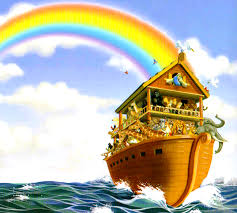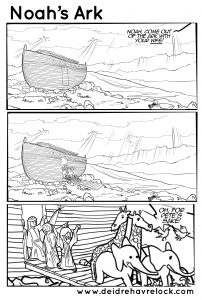Why is the Bible Mostly about Men?
Have you noticed that in the Bible men and sons seem oddly blessed with purpose? For instance, Noah and his sons (Shem, Ham, and Japheth) started a whole new world (we aren’t even told Noah’s wife’s name[1]). God stepped in and saved Abraham’s son, Isaac, from being sacrificed, establishing a covenant with him; but Jephthah’s daughter became a burnt offering because of her father’s rash vow—with no one stepping in to save her. Jacob and his twelve sons became a chosen nation; Jacob’s daughter, Dinah, was raped and Jacob’s wife, Rachel, died giving birth to Jacob’s beloved son, Benjamin. Aaron and his sons were chosen to minister in God’s holy temple; Aaron’s sister, Miriam, was punished with leprosy and was the first to die on the journey toward the Promised Land.[2] And then there was King David and his son Solomon, both were chosen by God and anointed as kings. But their wives? There were so many of them, it’s impossible to name them all!
It was during my first reading of the Bible that I noticed men working with sons held great significance and purpose. It seemed like God actually liked—dare I say preferred—working through them, but daughters and mothers I wasn’t too sure about. This brought me to questioning why? Why were men and sons so seemingly blessed with leadership? Why were women largely left to watch from the sidelines? Was this my fate because God preferred it and, therefore, ordained it? “Help me, Holy Spirit,” I began praying. “Help me understand how you feel about women.” After uttering that prayer a few times, and after spending time reading my Bible, I came across another interesting thread woven throughout our scriptures; this one was on partiality:
- Then Peter began to speak to them: “I truly understand that God shows no partiality, but in every nation anyone who fears him and does what is right is acceptable to him.” —Acts 10:34-35 (NRSV)
- For God shows no partiality. —Rom. 2:11 (NRSV)
- But the wisdom from above is first pure, then peaceable, gentle, willing to yield, full of mercy and good fruits, without a trace of partiality or hypocrisy. —Jas. 3:17 (NRSV)
The word partial means just that—in part. It means we do not appreciate the whole. We are partial to a portion. After reading about partiality in the Bible, I realized God, Jesus, and the Holy Spirit were in no way partial. They always embrace the whole. Therefore, whenever I read something in the Bible that suggested, even slightly, that God prefered to work through men (such as Jesus choosing to work with twelve male apostles), I reminded myself that God is not partial to working with men and the Holy Spirit does not have a trace of partiality. But still I wondered and prayed: Why does God choose over and over again to work primarily through men and sons? Finally, one morning (with this question lingering in my mind), I awoke to the voice of the Spirit saying to me, “Deidre, get up and read the story of Noah.”
The Story of Noah – Partiality

The Beginning of Salvation—Noah
In getting to know Noah, the first thing to notice is that his name means literally “rest”:
- When Lamech had lived one hundred eighty-two years, he became the father of a son; he named him Noah [Noäch, rest], saying, “Out of the ground that the lord has cursed this one shall bring us relief from our work and from the toil of our hands.” —Gen. 5:28-29, italics mine (NRSV)
It’s no coincidence that the name Noah means “rest.” Take a moment to remember, the people during Noah’s time had been working the cursed ground since the days of Adam:
- Cursed is the ground because of you [Adam]; in toil you shall eat of it all the days of your life; thorns and thistles it shall bring forth for you; and you shall eat the plants of the field. —Gen. 3:17-18
With the birth of Noah, Lamech’s hope was for a little relief from the toil of working this cursed ground. Perhaps in the mind of Lamech the name Noah was a prophetic declaration to end the curse. Or, at the very least, Noah (Lamech’s first-born son) would be sure to bring him some personal relief since there was now another set of hands able to work the fields.
As the story of Noah goes, the world was now fully corrupt with sin and violence: “The lord saw that the wickedness of humankind was great in the earth, and that every inclination of the thoughts of their hearts was only evil continually” (Gen. 6:5). Therefore, God came up with a plan. He would send a cleansing flood across the whole earth. However, he would save one family—not to mention a multitude of rambunctious animals—by having a man build an ark sturdy enough to withstand the coming waters. God chose Noah because he was the one righteous person left on earth. We are told in Genesis 6:9-10 that “Noah was a righteous man, blameless in his generation; Noah walked with God. And Noah had three sons, Shem, Ham, and Japheth.” (Ahem… Noah also had a wife.)
In due course, the directive for Noah to build the ark was sent out. Noah dutifully responded out of faith. Once the ark was built, God said to Noah:
- But I will establish my covenant with you; and you shall come into the ark, you, your sons, your wife, and your sons’ wives with you. And of every living thing, of all flesh, you shall bring two of every kind into the ark, to keep them alive with you; they shall be male and female. … Noah did this; he did all that God commanded him. —Gen. 6:18-19, 22, italics mine (NRSV)
Stop here and notice exactly how God told Noah to go into the ark: “you, your sons, your wife and your son’s wives.” Also notice how God told Noah to bring with him two of every kind of animal—male and female. God’s people enter the ark male united with male, and female united with female. The animals, however, enter two by two—male united with female. As the righteous Noah obeys God, the event is sealed with the standard closing, “Noah did all that the Lord had commanded him” (Gen. 7:5). This choreographed escape becomes our template for restoration. Why? Because Peter describes Noah’s salvation through water as a prediction of Christ’s coming baptism:
- God waited patiently in the days of Noah, during the building of the ark, in which a few, that is, eight persons, were saved through water. And baptism, which this prefigured, now saves you—not as a removal of dirt from the body, but as an appeal to God for a good conscience, through the resurrection of Jesus Christ. —1 Pet. 3:20-21 (NRSV)
Baptism = Restoration
God came up with a plan to bring about a universal restoration. Through the waters of “baptism,” God would save humanity and replenish the world with righteousness, restoring everything that had been lost through the onslaught of sin. In the early stages of Noah’s story, everything went as planned: the waters came, the family was saved, along with animals both male and female. Eventually the flood waters subsided and the ark came to rest on dry ground. It was here where God then commanded Noah to come out of the ark:
- In the second month, on the twenty-seventh day of the month, the earth was dry. Then God said to Noah, “Go out of the ark, you and your wife, and your sons and your sons’ wives with you. Bring out with you every living thing that is with you of all flesh—birds and animals and every creeping thing that creeps on the earth—so that they may abound on the earth, and be fruitful and multiply on the earth.” So Noah went out with his sons and his wife and his sons’ wives. —Gen. 8:14-18, italics mine (NRSV)
In the above verses, notice how God instructs Noah to come out of the ark: “Go out of the ark, you and your wife, and your sons and your sons’ wives” (italics mine).[3] However, Noah didn’t exactly exit with his wife. Noah walked out with his sons.
Imagine the ark with all the animals departing in pairs—two by two—male united with female. Bears: male and female; monkeys: male and female. The only pair that emerges differently is Noah and his family. They don’t come out two by two, male united with female as God commands. They come out male united with male, and female united with female. Noah and his family came out of the waters of baptism unchanged. They came out the same way they went in. Notice also, that this turn of events lacks the standard closing of, “Noah did all that the Lord had commanded him.” God is silent on the matter until Noah offers a burnt offering.
The Blessing of Noah and Sons—Domination
It was after Noah’s unfortunate exodus that he immediately set up a burnt offering, probably to say “thank you” for having been saved. You would think, at this point—since Noah was the only righteous man on earth—that God would have been greatly pleased with Noah. Instead God says this:
- And when the lord smelled the pleasing odor, The lord said in his heart, “I will never again curse the ground because of humankind, for the inclination of the human heart is evil from youth.” —Gen. 8:21, italics mine (NRSV)
The inclination—or the bend of the human heart—is toward evil. Ultimately, Noah had a chance for complete renewal—the reversing of the fall. But Noah’s heart (whether he realized it or not) did not wish to rule with his wife as God had first ordained dominion in the Garden of Eden (Gen. 1:28). Maybe, by this time, due to the fall, men had become accustomed to ruling over their wives.[4] Maybe, after losing everything in the garden, this small bit of authority gave men a feeling of importance and prestige, or maybe Noah simply forgot what true love was:
- You do well if you really fulfill the royal law according to the scripture, “You shall love your neighbor as yourself.” But if you show partiality, you commit sin and are convicted by the law as transgressors. —Jas. 2:8-9 (NRSV)
Although God had chosen Noah because he was “a righteous man, blameless in his generation” (Gen. 6:9), Noah fell short. His heart proved to lack in love because of the sin of partiality. Noah chose to rule with his sons despite God’s command to stand beside his wife. Because of Noah’s sin, the order of the new world was set.
From this point onward, God worked within Noah’s chosen paradigm of fathers united with sons. Consequently, God blessed not Noah and his wife—as He originally blessed Adam and Eve in the Garden of Eden—but rather, in this new world, God blessed Noah and his sons:
- Noah and Sons’ Blessing:
God blessed Noah and his sons, and said to them, “Be fruitful and multiply, and fill the earth. The fear and dread of you shall rest on every animal[5] of the earth, and on every bird of the air, on everything that creeps on the ground, and on all the fish of the sea; into your hand they are delivered.” —Gen. 9:1-2, italics mine (NRSV)
Now compare that blessing with Adam and Eve’s original blessing:
- Adam and Eve’s Blessing:
God blessed them [man and woman], and God said to them, “Be fruitful and multiply, and fill the earth and subdue it; and have dominion over the fish of the sea and over the birds of the air and over every living thing that moves upon the earth.” —Gen. 1:28 (NRSV)
[tweetshare tweet=”God worked within Noah’s chosen paradigm of fathers united with sons and blessed NOT Noah and his wife as He originally blessed Adam & Eve in Eden, instead God blessed Noah & Sons.” username=”deidrehavrelock”]
Biblical Patriarchy
What fathers and sons received was not dominion; what they received was domination: “The fear and dread of you will be on all living.” In the garden (before the fall) there was no fear, there was no dread. There was simply the joy of unity, of man and woman being who they were created to be, children of God, images of the Almighty, and neighbors with authority. But with woman’s blessing usurped, now not only would the husband rule his wife, now men and sons would dominate the landscape. And certainly, from this point onward, men and sons dominate our scriptures; and throughout the course of history, they have dominated the world; and even today, though many have repented, men and sons within our churches continue to uphold a doctrine of domination.
[tweetshare tweet=”Biblical patriarchy is upheld by Noah as he disobeys God’s command to come out of the waters of baptism with his wife at his side in a restored order, choosing instead to stand with his sons.” username=”deidrehavrelock”]
Despite this, restoration is on its away. Today, a radical transformation is coming to the church as repentance for the sin of partiality begins to take place and the blessing of dominion is restored to the earth. Thankfully, the oppressive days of patriarchal “fear and dread” are coming to an end as God’s people choose to embrace the blessing of dominion over the blessing of domination.
[1] According to the “Midrash Rabbah Genesis” (pg. 56), Noah’s wife’s name was Naamah. The Book of Jubilees names her as Emzara (Chapter 4:33).
[2] Miriam was the first to die, see Num 20:1-2. According to The Book of Jasher, Miriam died on the first month of the fortieth year; Aaron died on the fifth month of the fortieth year, and Moses died before the closing of the year.
[3] You may need a literal Bible translation in order for this prioritizing of peoples entering and exiting the ark to be apparent. Many interpretive Bible translations lose the purposeful order. The NIV states the verse as: “Then God said to Noah, “Come out of the ark. Bring your wife and your sons and their wives with you.”
[4] See Gen 3:16, “To the woman he said, ‘I will greatly increase your pangs in childbearing; in pain you shall bring forth children, yet your desire shall be for your husband, and he shall rule over you.’”
[5] Although the NRSV uses the word “animal,” the actual word used in Hebrew is chay, meaning “alive” as in “The fear and dread of you shall rest on all living on the earth.”









Deidre, I couldn’t help but think of how the men disciples were offended when Mary of Bethany anointed and wiped the feet of Jesus. Did they not want to dominate and control the situation? Yet Jesus isn’t offended. The men disciples wanted power to rule, to sit one day at Jesus’ right and left hand. The women disciples never asked for position or power, they simply wanted Him. We can learn a lot from the women disciples of Jesus, especially when it comes to being part of the Bride of Christ. The Bride will one day be the Queen ruling alongside of her King with dominion, as it should have been all along. What would the church look like if men would allow women to “rule” alongside them in ministry? I suspect a whole lot different than it does today. May that day come soon!
Great comment, Steve! Domination and control is so much of the problem. We can learn from the men disciples who certainly did want power to rule.
Although, I don’t think women are looking for men to “allow women to rule alongside them” simply because both men and women already rule with Jesus through grace… what we’re looking for is repentance and humility. Those are the men I want to work with.
This is not accurate. Only Judas was offended by Mary of Bethany annointing Jesus’ feet. And if you read further, the Bible says that Judas said it should’ve been sold and the money given to the poor. And further, it says that Judas said this, not that he cared for the poor, but he was a thief, and used to steal from their common ministry funds.
My spirit feels sure you are right about the difference between dominion (Adam and Eve) and domination (Noah and sons).
I shared this in an egalitarian Facebook group
Thank you for sharing, always appreciated.
Note also that in Gen. 3:21 God removes the curse on the ground that was established as partial punishment for man’s sin of rebellion against God’s command. If this curse is lifted would it not seem true that the curse on woman – to be under man’s rule – would also be lifted? Yet Noah looked only to himself and his relationship with God and his sons, as you accurately portray. He ignored God’s direction and the error continues today.
Thanks for this post Deidre. It gives me hope that we, the Church, can come to terms with our mistaken beliefs. I’ve been thinking lately why the language of the bible is so Male friendly. Why would a God who clearly loves me and the awesome women I know choose to put one gender above another? I thought maybe He talked like that bc it’s the only way ancient generations could hear and comprehend Him. Ive still been wondering and this post gives clear answers from the Bible. Your “voice” is important for healing in the Church and around the world. Praying we all have ears to hear. Thanks again.
Thanks Deidre for this post. If history tells use one thing it is that men have always put themselves above women. Like Tara, in my heart of hearts, I know that God loves human kind equally. History is not an testimony to truth nor should history be a burden on the memory, but instead, an illumination of the soul.
Hi there. Love your blog. I have a slightly different take on the source and/or beginning of patriarchy. When reading the following section of Adam and Eve story, I always found it interesting that it seems that only Adam was banished from the garden:
Genesis: 3:23 So the LORD God banished HIM from the Garden of Eden to work the ground from which HE had been taken. 24 After he drove THE MAN out, he placed on the east side of the Garden of Eden cherubim and a flaming sword flashing back and forth to guard the way to the tree of life.
Is it possible that Eve was not banished from the Garden? Since her desire was now for her husband, she chose life with him outside the garden as we learn in chapter 4, but it wasn’t required. But because she chose her husband (Adam) over the GOD it was fulfilled what God said about her in Genesis 3:16:
you will long for your husband
Which then resulted in the curse:
and he will rule over you.
Love to hear your take on this.
I’m glad you brought that up. My next blog post is on that topic. I should have it posted early next week. Yes, Adam is the one who is banished from the garden… thanks for following the blog!
“Abashed the devil stood and felt how awful goodness is and saw Virtue in her shape how lovely: and pined his loss.” -John Milton
You really need to read more of the English launguage if you take this verse and create a sin out of it. What a crock.
18 So Noah came out, together with his sons and his wife and his sons’ wives. 19 All the animals and all the creatures that move along the ground and all the birds—everything that moves on land—came out of the ark, one kind after another.
May I ask if you have read this one.
Rev 22: …If anyone adds anything to them, God will add to that person the plagues described in this scroll. 19 And if anyone takes words away from this scroll of prophecy, God will take away from that person any share in the tree of life and in the Holy City, which are described in this scroll.
Deuteronomy 4:2 “You shall not add to the word which I am commanding you, nor take away from it, that you may keep the commandments of the Lord your God which I command you.” In Deuteronomy 12:32 he added, “Whatever I command you, you shall be careful to do; you shall not add to nor take away from it.” Proverbs 30:5–6 warns, “Every word of God is tested; He is a shield to those who take refuge in Him. Do not add to His words or He will reprove you, and you will be proved a liar.”
You have ‘added to’ the word your own ideas and thoughts that have NO basis in the Bible.
Noah did not sin just because it was mentioned Noah his sons and his wife, did you read that part? “and his wife” which negates your entire arguement.
I obviously disagree with you, but thank you for stopping by!
I also see that the Old Testament was dominated by the male because the Holy Spirit was not yet poured out. Jesus was the full expression of the godhead bodily, and Jesus uses the metaphor of a mother hen, not a cockerel. So in this sense I believe Jesus was the full image of God, both the masculine and feminine united (echad) so to speak . However, the word given to Eve at the beginning was a war between the serpent’s seed and her seed which still rages in the new covenant, because we together are not yet in fullness. We corporately have not yet crushed the head of the Serpent. However, that process began when Jesus bruised his head at Calvary. It is finalised when the last enemy death is defeated x